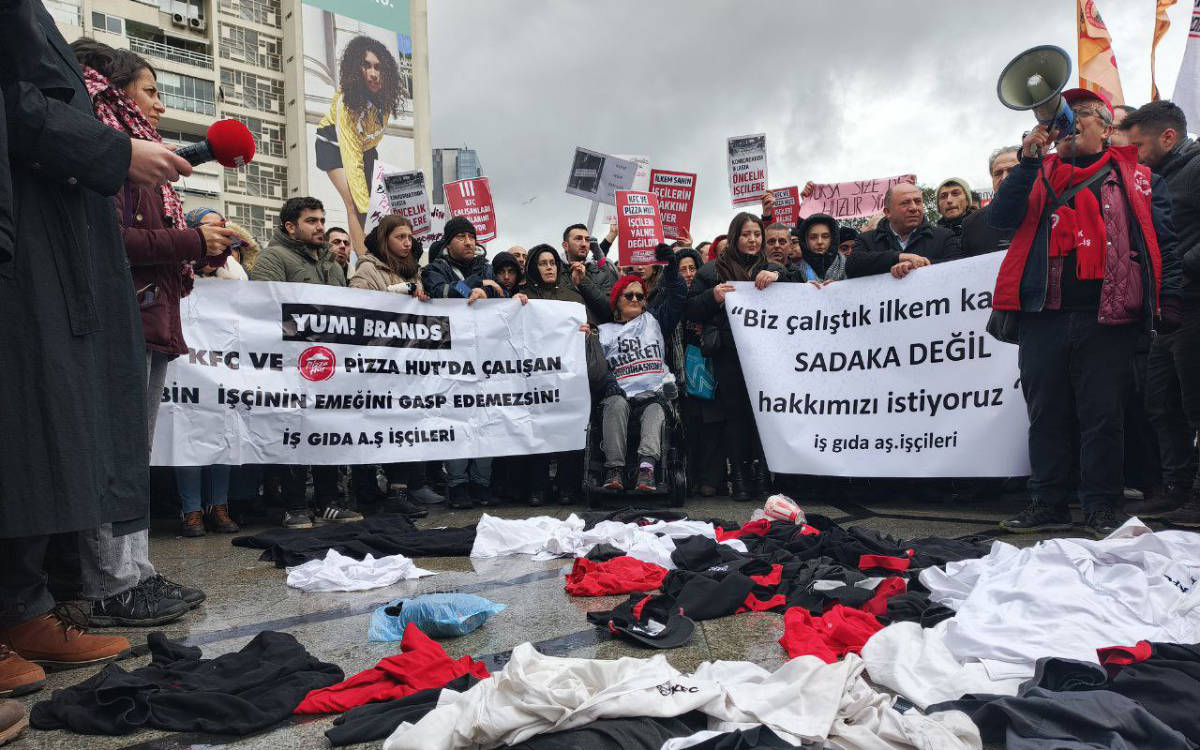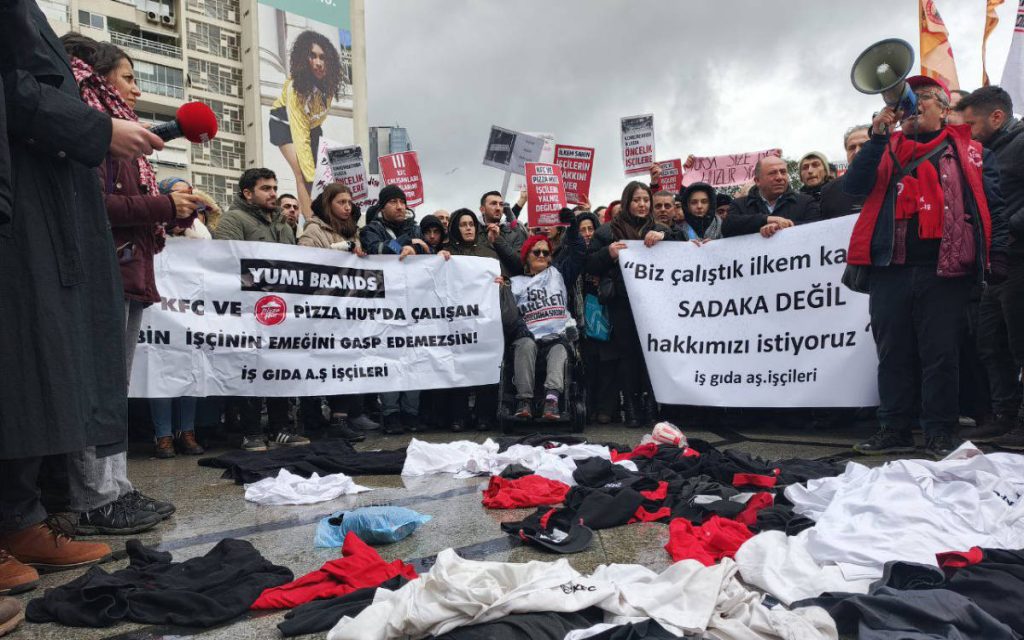
İş Holding, known for its franchises of KFC and Pizza Hut in Turkey, has applied for debt restructuring amid significant financial troubles, with liabilities amounting to 7.7 billion liras (approximately 213 million US dollars). In a recent court ruling, a temporary respite of three months was granted to the company and its owner, İlkem Şahin, who has been under scrutiny following wage protests by employees across major Turkish cities. Approximately 6,000 workers have not received their salaries, prompting calls for investigation into the financial practices of the holding and greater protections for those affected.
| Article Subheadings |
|---|
| 1) Overview of İş Holding’s Financial Crisis |
| 2) Employee Protests and Their Implications |
| 3) Legal Perspectives on Bankruptcy and Employee Rights |
| 4) Background on İş Holding and its Operations |
| 5) The Future of İş Holding and Worker Protections |
Overview of İş Holding’s Financial Crisis
İş Holding has recently found itself at the center of a financial storm, having accrued substantial debts estimated at 7.7 billion liras. This dire situation prompted the company to seek legal protection through debt restructuring as a remedy for its mounting liabilities. The court has temporarily assigned a bankruptcy administrator, granting the company three months to reorganize its finances. This restructuring application raises concerns regarding the treatment of employees, particularly in light of their unpaid wages, which has reportedly led to widespread unrest among the workforce.
The financial complications for İş Holding began to unfold against the backdrop of many of its international operations, particularly in Germany, which succumbed to bankruptcy. The company’s parent, which oversees various sectors such as agriculture, energy, and logistics, is also being scrutinized for its decision-making practices. The turmoil raises critical questions about how such a significant financial collapse impacts the employees and overall market dynamics in Turkey.
Employee Protests and Their Implications
As the news of the financial strife spread, employees of İş Holding initiated protests in multiple cities, including İstanbul, Bursa, and Ankara, demanding their overdue wages. Reports indicate that approximately 6,000 workers have not been compensated for their efforts in 450 restaurants under the İş Gıda banner. This sequence of events highlights the tension between corporate financial health and employee welfare, as workers demand action regarding their severance, notice pay, and unpaid overtime.
The protests serve as a galvanizing moment for workers, showcasing their solidarity against what they perceive as negligence and greed on the part of the holding’s management. Demonstrators are further advocating for a thorough investigation into the assets of other companies within the holding, as they believe that mismanagement and profit-driven decisions potentially victimized the workforce. This unrest poses a significant challenge to İş Holding, as it seeks to navigate its financial difficulties without alienating its employees further.
Legal Perspectives on Bankruptcy and Employee Rights
Legal experts emphasize the obligations a company holds towards its workers, even during financial restructuring. Sevgi Evren, a labor lawyer, argues that the legal frameworks currently in place inadequately protect employee rights in such scenarios. She pointed out that, rather than prioritizing worker compensation during the restructuring process, the existing laws tend to favor employers, which can lead to significant hardship for employees.
Evren noted that the law stipulates workers should be considered first creditors should the company enter bankruptcy; in reality, however, public debts are typically prioritized. Such legal discrepancies not only complicate financial recovery for employees but also lead to calls for legislative reform and greater protections for the workforce in similar situations across Turkey. The situation with İş Holding has thus highlighted systemic failures that need to be addressed in labor legislation to ensure fair treatment for employees amidst corporate financial struggles.
Background on İş Holding and its Operations
Founded in 1950 by Hüseyin Şahin, İş Holding originally operated in the home textile industry. Over time, the company underwent significant transitions, ultimately evolving into a conglomerate known for franchises such as KFC and Pizza Hut, acquired from Yum Brands in 2020. The rebranding to İş Holding took place in 2014 under the leadership of İlkem Şahin, who has significantly expanded the company’s portfolio across various sectors, including logistics, agriculture, and media.
In recent years, the holding has received recognition, including being named franchisee of the year by Yum Brands in 2023. Despite these accolades, the financial distress sweeping through İş Holding raises questions about sustainable business practices and strategic decision-making. Economic downturns, alongside the previous bankruptcies in its German subsidiaries, reveal vulnerabilities in the corporation’s business model that necessitate ecosystem-wide scrutiny.
The Future of İş Holding and Worker Protections
Looking ahead, İş Holding faces considerable challenges as it seeks to recover from its financial predicament. The path to stability may hinge on not only restructuring its debts but also addressing the legitimate grievances of its workforce. Employee coalitions are advocating for stronger labor rights and protections, highlighting the need for company accountability toward its workers.
Given the legal limitations currently outlined, it is essential for workers to unite and effectively pressure the appropriate authorities for resolutions that prioritize their rights. Labor experts suggest that collective bargaining agreements or unionization could serve as vital avenues for securing employee interests. As the situation unfolds, the outcome for İş Holding and its employees will serve as a litmus test for labor relations in Turkey and potentially inform future legislative changes in the ongoing struggle for worker rights.
| No. | Key Points |
|---|---|
| 1 | İş Holding has applied for debt restructuring due to severe financial liabilities of 7.7 billion liras. |
| 2 | Approximately 6,000 workers have protested for unpaid wages in several major Turkish cities. |
| 3 | Legal counsels indicate that current laws may inadequately protect worker rights during bankruptcy proceedings. |
| 4 | The history of İş Holding includes transitions from textiles to hospitality and various sectors under İlkem Şahin’s leadership. |
| 5 | The future stability of İş Holding may depend on addressing employee grievances along with debt resolution strategies. |
Summary
The financial crisis facing İş Holding underscores the complexities of corporate debt management and the impacts on employees. With significant protests arising from unpaid wages, the situation calls for immediate attention to legal protections for workers. As İş Holding navigates its restructuring process, the outcomes will not only define the future of the holding itself but could also initiate crucial discussions regarding labor rights and protections in Turkey, setting precedents for how businesses manage financial difficulties while ensuring the welfare of those who operate them.
Frequently Asked Questions
Question: What are the implications of İş Holding’s debt restructuring for its employees?
The restructuring may delay wage payments and impact employee rights unless urgent action is taken to protect their interests during the process.
Question: How does the protest by employees reflect their rights in Turkey?
The protests illuminate the struggles workers face in obtaining their rightful wages and highlight the need for stronger legal frameworks protecting employee rights during corporate financial distress.
Question: What actions can employees take amidst this financial crisis?
Employees can unite to demand their rights, potentially through collective action or seeking assistance from labor unions to advocate on their behalf.
